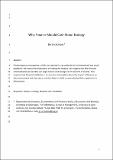Files in this item
Why finance should care about ecology
Item metadata
| dc.contributor.author | Scholtens, Bert | |
| dc.date.accessioned | 2018-04-27T23:33:12Z | |
| dc.date.available | 2018-04-27T23:33:12Z | |
| dc.date.issued | 2017-07 | |
| dc.identifier | 249730535 | |
| dc.identifier | ecd893c3-ddac-4809-a14f-31941583af0e | |
| dc.identifier | 85018173843 | |
| dc.identifier | 000403237400003 | |
| dc.identifier.citation | Scholtens , B 2017 , ' Why finance should care about ecology ' , Trends in Ecology and Evolution , vol. 32 , no. 7 , pp. 500-505 . https://doi.org/10.1016/j.tree.2017.03.013 | en |
| dc.identifier.issn | 0169-5347 | |
| dc.identifier.other | ORCID: /0000-0001-5774-5191/work/69834981 | |
| dc.identifier.uri | https://hdl.handle.net/10023/13253 | |
| dc.description.abstract | Finance ignores ecosystems, which has resulted in a growing list of environmental and social problems. This article assesses the importance of ecology for finance. It suggests that the financial intermediation perspective can align finance and ecology for the benefit of society. This requires that financial institutions account for information about the impact of finance on the environment and vice versa, and that they are held accountable by their supervisors in this domain. | |
| dc.format.extent | 6 | |
| dc.format.extent | 372771 | |
| dc.language.iso | eng | |
| dc.relation.ispartof | Trends in Ecology and Evolution | en |
| dc.subject | Ecology | en |
| dc.subject | Finance | en |
| dc.subject | Financial intermediation | en |
| dc.subject | GE Environmental Sciences | en |
| dc.subject | HG Finance | en |
| dc.subject | T-NDAS | en |
| dc.subject.lcc | GE | en |
| dc.subject.lcc | HG | en |
| dc.title | Why finance should care about ecology | en |
| dc.type | Journal article | en |
| dc.contributor.institution | University of St Andrews. School of Management | en |
| dc.contributor.institution | University of St Andrews. Centre for Responsible Banking and Finance | en |
| dc.identifier.doi | 10.1016/j.tree.2017.03.013 | |
| dc.description.status | Peer reviewed | en |
| dc.date.embargoedUntil | 2018-04-27 |
This item appears in the following Collection(s)
Items in the St Andrews Research Repository are protected by copyright, with all rights reserved, unless otherwise indicated.

